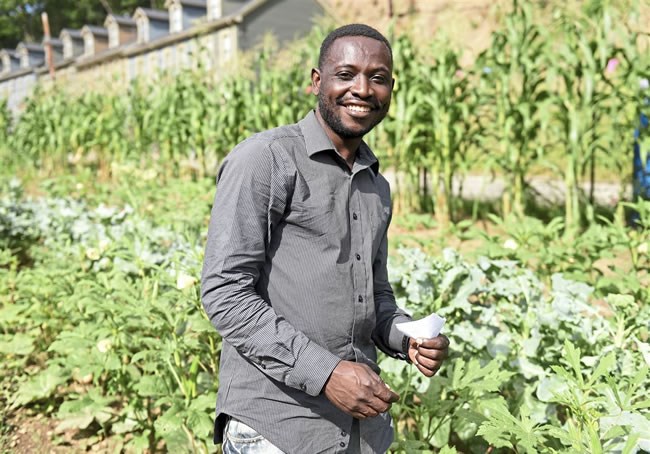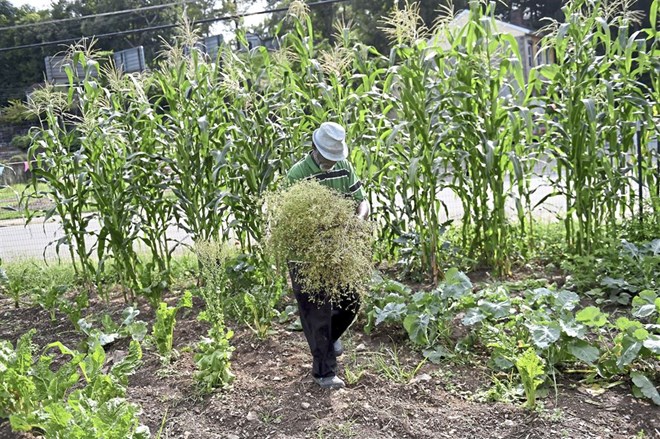Pittsburgh Post- Gazette
Sunday September 8, 2019
Abdulkadir Chirambo, head of the United Somali Bantu of Greater Pittsburgh, on the lot he farms with other members of the Somali community at the intersection of North Charles and Strauss Street in Perry South Friday, Aug. 23, 2019. (Pam Panchak/Post-Gazette)
Bare Bule was the only farmer at the Mwanakuche Community Garden in Perry South one recent afternoon when an SUV pulled up, a woman got out and approached him. Residents sat on stoops of nearby townhouses.
“We want to help you sell your stuff,” Melodye Martin told Mr. Bule, speaking for her church congregation. “We want to volunteer to help you.”
Mr. Bule smiled and nodded but appeared to lack English enough to take her meaning. He speaks and understands Kizigua and Maay Maay.
Ms. Martin said she saw a lot of potential revenue not being harvested, but revenue is not the only motive of the Somali Bantu men who tend the ¾-acre garden, now in its second growing season at North Charles, Strauss and Izora streets.
Residents of the Charles Street Valley, as residents call it, are almost wholly low-income. When Thursday farmers market concludes, the farmers carry boxes of free produce that didn’t sell to nearby homes.
“This summer, 70 to 80 percent of the produce went to the community,” said Abdulkadir Chirambo, garden manager and president of the United Somali Bantu of Greater Pittsburgh, comprised of people from the east African country of Somalia. He meant both the Somali community and immediate residents.
A grassy lot
In 2016, before the Mwanakuche garden, the land was a grassy lot with a sycamore tree along Izora, a short alley.
“In June of 2017, we were authorized to use it,” Mr. Chirambo said. “I sat down with the elders and said, ‘This is what we’ve been given but we need to mow it.’ The weeds were this high.” He held his hand at his hip.
The garden comprises 15 of 150 vacant lots the city lends to individuals and organizations to grow food, flowers or establish rain gardens.
“We don’t technically own them because they are still in someone else’s name,” said Shelly Danko Day, manager of the city’s Adopt-a-Lot program. “It takes two years to quiet a title and with so many lots, we are not making real estate decisions until someone wants to start the process. Thus, the land is in limbo.” “Quieting”
a title is done to make sure there are no other legal claims to the property.
Until a buyer comes along, the city collaborates with organizations that include Grow Pittsburgh, the Western Pennsylvania Conservancy and the Food Policy Council to help people use the land productively.
The Somali farmers pay liability insurance and $25 a year for a farm stand license.
The garden has received support from the Buhl Foundation, Grow Pittsburgh and Bridgeway Capital.
The soil tested safe for use, but the farmers amended it with compost.
“We started this with $3,000,” Mr. Chirambo said. “Bob Mistick also helped us with nine loads of mixed soils and gift cards. We also have gotten donations of money and seeds.”
Mr. Mistick co-owns Northside Residences, formerly Northside Properties. The company owns and manages 100 subsidized townhouses in and around the Charles Street Valley.
“People have to support things to keep the world from falling apart,” he said when asked why he supports the garden. “The garden is in my interest because it calms the space and has a life-affirming message for the community, plus the Somalis are trying to improve the land and they are really nice guys.”
The farmers want to make the garden pay for itself, but a lot of produce is not being picked because there is no storage or refrigeration.
“Storage is our big challenge,” Mr. Chirambo said, picking off an okra pod and biting into it.
Meanwhile, much produce that appears to be going to waste is being dried for seed salvaging. A certain amount of produce has to become the source of next year’s planting.

Bare Bule, of Fineview, collects radish seeds for next year's planting at the garden in Perry South led by Abdulkadir Chirambo of the Somali Bantu community in Pittsburgh.
(Pam Panchak/Post-Gazette)
A second garden
He said the community hopes to start a second garden next year in Northview Heights, where many Somali Bantu live.
Between 2003 and 2018, 369 Somali Bantu people — a marginalized minority in Somalia — were resettled in the Pittsburgh area. Resettlement agencies grouped them in neighborhoods including Upper Lawrenceville, from which they moved to the Hill District, then to Northview Heights, always for reasons of housing costs.
“There was a lot of misunderstanding about our community,” said Mr. Chirambo, who now lives in McKees Rocks. “The elders thought they would be in a place where they could farm.”
Mr. Chirambo was a baby when his family fled the civil war in Somalia for Kenya, where he went to school. In 2004, his family’s application for immigration was rewarded with resettlement in Erie, where he attended high school.
He came to Pittsburgh in 2008 to study criminal justice at the Pittsburgh Technical College in Oakdale, graduating in 2011.
“I am not a farmer,” he said, smiling. “My dad, but not me. He pushed me toward education. But I am learning from the elders.”
He explained that elders aren’t merely older. To earn the honorific, they have to have knowledge of and experience in the community, be respected and good communicators. Often, before anyone calls 911, the community seeks elders to mediate disputes.
Mr. Chirambo volunteers as head of the United Somali Bantu — helping to organize English classes, childrens’ activities, transitional housing, health care and job assistance. For pay, he is a translator in court, in hospitals and at doctors’ offices.
“I got a call from a woman who was scheduled for surgery but she said no and called me. The doctor said the surgery had been planned but she is saying no. He didn’t understand that there is no trust. She is not hearing a voice she knows. It’s not just that a translator can speak English but you have to understand.”
He drew that last word out, which led the conversation to towering rows of corn laden with ears that were clearly ready to pick — clearly ready by American standards.
As Ms. Martin, a congregant of Love Ministries, walked the garden with Mr. Bule days before, she said, “This corn is ready.”
“Not ready,” Mr. Bule said.
She threw him a look that said, “You’re kidding,” but he insisted, “Not ready.”
Mr. Chirambo explained later: “In Somalia, people wait until the corn is almost dry.” He yanked off an ear and shucked it. The corn had the rubbery feel that most Americans consider ready to toss into boiling water. He picked another cob, whose kernels felt more like plastic.
“This is when we eat it,” he said. At the suggestion that the largest market for the corn are buyers who like tender ears, he laughed and said, “So, it is ready to sell. This is something I can teach the elders.”
Diana Nelson Jones: [email protected] or 412-263-1626. Twitter@dnelsonjones.